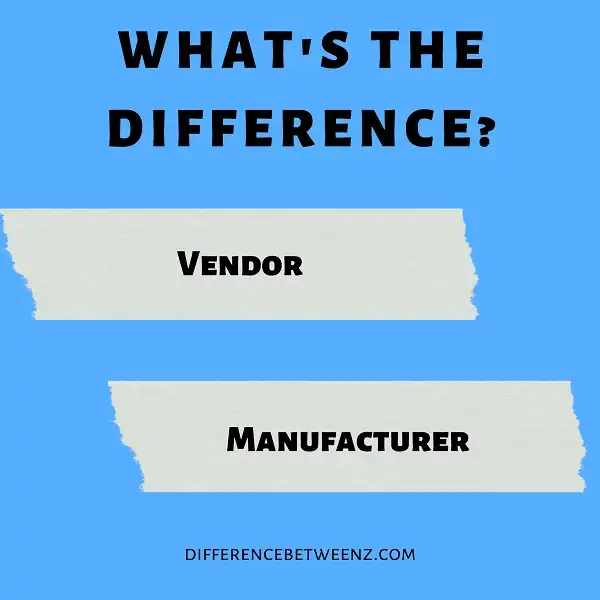Are you confused between the terms “vendor” and “manufacturer”? If so, then you’re not alone! The two concepts are often used interchangeably, but it’s important to understand that there is a distinct difference between them. When it comes to understanding business operations and economy terminology, distinguishing the nuances of these two roles can be essential for success. In this blog post, we’ll cover what vendor and manufacturer mean as well as their key distinctions—so you’ll know exactly how to refer to each when necessary.
Who is Vendor?
Vendor is a crucial part of the supply chain process, bridging manufacturers and customers. Vendor roles can vary widely, depending on the industry and type of product or service offered.
- They may provide materials or components to build finished products, help market and distribute products, offer technical services, facilitate purchasing activities, arrange delivery schedules, provide warranty support and more. Vendor management has become increasingly important in recent years as organizations strive to ensure quality amenities at competitive prices.
- Vendor relationships are key to long-term success for many companies because of their reliance on strategic outside partners encompassing legal obligations and duties of both parties.
- Vendor management systems have been designed to make sure businesses stay in compliance with regulatory frameworks while ultimately creating an ideal symbiotic relationship between buyers and sellers.
Who is a Manufacturer?
- Manufacturer is a term that can indicate many different types of business, depending on the context in which it is being used. In a manufacturing context, Manufacturer refers to those companies that make products out of raw materials and parts, such as cars or computer chips.
- Manufacturer may also refer to those businesses that package and distribute products they buy from wholesalers or producers. In a retail setting, Manufacturer can mean the producer who makes a certain line of clothes or kitchen appliances.
- A Manufacturer skillset also often includes engineering, research and development practices as well as design and marketing expertise along with customer service orientations. It takes a range of skills, personnel and processes to successfully manufacture high-quality products.
Difference between Vendor and Manufacturer
- Vendor and Manufacturer are two distinct types of companies that act as intermediaries in the business world, but they serve very different functions. The vendor is a term used to refer to a reseller who helps facilitate the transfer of goods or services from one party (typically a manufacturer) to another, often acting as an intermediary between them and their customer.
- Manufacturers, on the other hand, produce goods themselves: they have complete control over the entire development life cycle, from design and production through packaging and delivery.
- Whereas Vendor provides convenience for customers by eliminating complex negotiation processes with supply vendors, manufacturers are responsible for offering high-quality products at competitive prices.
Conclusion
If you are in the market for a new product, it is important to understand the difference between a vendor and a manufacturer. A vendor is simply a company that sells products, while a manufacturer produces products. There are advantages and disadvantages to working with each type of company. By understanding the difference between vendors and manufacturers, you can make an informed decision about which type of company is right for your needs.


